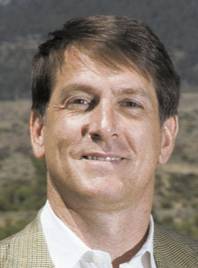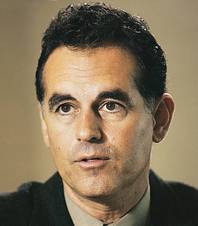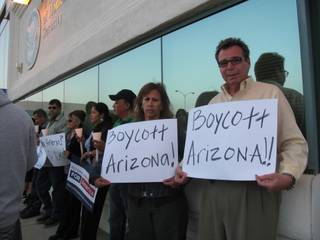Friday, April 30, 2010 | 2:01 a.m.
Reader poll
Sun Archives
- Protesters in Las Vegas rally against new Arizona immigration law (4-28-10)
- Harry Reid calls for border security before legalization (4-28-10)
- Gibbons sends letter to Obama on immigration reform (4-27-10)
- Group plans Arizona boycott, criticizes new immigration law (4-26-10)
- Gibbons demands Obama take action on immigration (4-26-10)
- Arizona governor signs immigration enforcement bill (4-23-10)
Sun Coverage
Nevada politics are suddenly being reshaped by Arizona, where Gov. Jan Brewer signed a tough anti-illegal immigration law last week.
In doing so, she awakened the immigration debate that had gone dormant in recent years in the face of the economic collapse.
She also likely did Senate Majority Leader Harry Reid a favor.
President Barack Obama pushed up Hispanic turnout to 15 percent of the electorate in 2008, compared with 10 percent in 2004, and he won 70 percent of those voters, according to exit polls.
But Democrats won on the promise of immigration reform that would help at least 10 million people currently in the U.S. illegally eventually become citizens. It was a promise unkept, however, as the administration and Reid moved on other fronts, including the economic stimulus, health care and now reform of Wall Street.
The Arizona law has suddenly mobilized Hispanics, and Reid is looking to capitalize.
“I believe that Democrats are hoping that the Arizona immigration law fires up their base like no other issue has been able to since Obama’s election,” Jennifer Duffy, an analyst for the Cook Political Report, wrote in an e-mail.
“Democratic senators like Reid who are facing very tough races need the base to turn out in very high numbers to offset the intensity on the Republican side. Perhaps this will do it,” she added.
The Arizona law’s most contentious provisions would make being in the country illegally a state crime; force immigrants to carry identifying papers; and require police to question the immigration status of anyone suspected of being in the country illegally. Race and country of origin can’t be the only factor in determining “reasonable suspicion” of being here illegally.
Kris Kobach, a conservative law professor who helped draft the legislation, took to the pages of The New York Times to defend the legislation.
He noted: It’s federal law that immigrants must carry identifying papers; “reasonable suspicion,” a term mocked by the law’s critics as creating the opportunity for racial profiling, is not a new legal concept and is embedded in law; all Fourth Amendment protections against racial profiling will still apply; the Supreme Court has upheld the right of states to enact laws to discourage illegal immigration even though it is primarily a federal issue.
Still, the law has been roundly condemned by Democrats, and more than a few Republicans, including former Florida Gov. Jeb Bush, who told Politico, “It’s difficult for me to imagine how you’re going to enforce this law. It places a significant burden on local law enforcement, and you have civil liberties issues that are significant as well.”
With the Arizona law at the forefront of the political mind, the Sun asked Reid and his Republican challengers about the law and their thoughts about immigration.
Sen. Harry Reid

Harry Reid
Reid opposes the Arizona law, which a spokesman called the “legalization of racial profiling” and believes it underscores why comprehensive reform is needed this year.
Reid and Senate Democrats laid out the framework of reform legislation Thursday, with an emphasis on border security first.
Under the outline, the federal government would enhance border security and create a fraud-resistant Social Security card. Illegal immigrants would have to admit they broke the law, pay back taxes and fees and pass criminal background checks for legal residency after eight years.
“Our immigration system is broken,” says Reid, who surprised his Washington colleagues by promising reform at an immigration rally in Las Vegas a few weeks ago. “We’re offering this framework as an invitation, an invitation to our Republican colleagues to work with us to solve this problem that has plagued our country for too long.”
Reid has been accused of playing cynical politics.
Last week, Lindsay Graham, R-S.C., had announced support for climate-change legislation. But then Reid, who needs to fire up his Hispanic Nevada base, said immigration would come first. So Graham dropped his support on climate change. The potential result is that neither piece of legislation — both of which are highly contentious in both parties — will get done.
On his blog at The New Republic, Jonathan Chait wrote, “It’s outrageous to sacrifice a chance to make progress on the biggest single policy challenge (climate change) merely to increase the re-election chances of one senator.”
But it’s not clear either piece of legislation would have passed even if Reid had pursued climate change first; Reid appears to be following the path that will be of most help to Democrats in November.
Sharron Angle

Sharron Angle
Angle, the former assemblywoman endorsed by the national Tea Party Express group, not surprisingly takes a conservative stance on illegal immigration. She supports Arizona’s new law, wants to build a fence or two on the border and create a “less illegal-friendly environment.”
In written responses to questions from the Sun, Angle would not say whether she supports eliminating education and emergency room access for illegal immigrants.
Instead, she responds with questions that imply she would at least consider it: “Should the taxpayers of Nevada be paying the cost of educating the children of illegals? Should an American citizen with a sick child wait in line at a hospital behind an illegal? No one wants to see a genuinely sick person turned away, but our priorities are all wrong when we don’t consider the consequences of these laws.”
She calls Arizona’s law an outgrowth of the failure of the federal government to secure the borders and a “reasonable measure ... to deal with a serious problem in that state.” Provisions in the law would “actually reduce the likelihood of racial profiling” by forcing police to call the federal immigration hotline. She says police already use “reasonable suspicion” as a law enforcement tool.
On how to protect the border, she points to Israel’s efforts to combat terrorism. “The answer comes down to a fence. It may require two sets of fences and patrols to go with them, but it can be done.”
John Chachas

John Chachas
Chachas, the New York investment banker who has returned to his childhood hometown of Ely to run for Senate, offers the most intellectually rigorous and nuanced answers to the Sun’s query.
Arizona has every right to enact its immigration law, he says, noting the state was merely taking necessary steps given the failure of the federal government to protect the border. Yet he expresses concerns about the law’s implementation.
Chachas offers a kind of eulogy to the days when Americans could walk the streets unfettered: “It is worth noting that in many countries around the world, a policeman or military officer may, with very limited cause, ask any citizen to offer their ‘papers please.’ American society — the freest in the world — may be entering a period where our historic standards for personal freedom and the burden against government intrusion are challenged.”
On the issue of racial profiling, Chachas says: “The consideration of race has been allowed in American life in many constructive ways in our recent history, including the validation of affirmative action. ... Here, we are seeing the inverse where race is meant to be among the factors, but not the only factor, in law enforcement’s duty to pursue violations of immigration laws.”
For a country with a $700 billion defense budget, there’s no excuse not to secure the border, he says. “If we can secure the border between North and South Korea does anyone really believe we can’t create an appropriate barrier between Juarez and El Paso?”
On a “path to citizenship,” Chachas says undocumented workers who will pay unpaid back taxes, fines and penalties should have a path to legal residency and citizenship in the typical time frame, though those who have been complete tax scofflaws should be deported.
Chachas does not favor turning away gravely ill or injured illegal immigrants from emergency rooms. However, “I do not believe that it would be wrong for state statutes to dictate that emergency rooms may turn away noncritical patients — whether they be legal residents or illegal — if there is no proof of a means to pay for services,” he adds.
Chachas would also accept all children into the schools until federal authorities determine legal residence of children. “Accepting year after year multiple children of illegal immigrant families who pay inadequately is not acceptable or fair to American taxpaying citizens,” he says.
Sue Lowden

Sue Lowden
Lowden, a former state senator and chairwoman of the Nevada Republican Party, supports the Arizona law.
“I’m not sure it’s constitutional,” Lowden says. “We’ll have to let the courts decide that, but they’ve made a line in the sand saying to the federal government: ‘It’s your job to take care of the border and you are letting us down.’ ”
And while critics, such as the American Civil Liberties Union, have said the new law will increase racial profiling and discrimination against Hispanics, Lowden spokeswoman Crystal Feldman says there’s little danger of that because the state law “mimics” federal law, “which requires all foreign nationals to carry their papers at all times.”
She adds: “Racial profiling should never be utilized and is not legal.”
As for immigration reform, Lowden says there is no need for additional legislation. The government, she says, should enforce the laws on the books. To secure the borders, the government should use technology to track movement and increase the number of border patrol agents, a task that for years has been elusive given rigorous skill requirements of the job.
The top priority, however, should be cracking down on employers who hire illegal immigrants, she says. “Without a source of income here, there is no incentive for them to stay in the U.S.,” Feldman says.
Lowden opposes a path to citizenship for those living here illegally. “If your first attempt to become a citizen includes cheating the system and showing contempt and disregard toward the rule of law, you should not have the right to simply pay a fine to skip to the front of the line,” Feldman says.
As for education and emergency care, she said Lowden “does not believe we should punish children for their parents’ transgressions,” citing the Supreme Court cases guaranteeing those protections.
Danny Tarkanian

Danny Tarkanian
Tarkanian, a lawyer and Las Vegas businessman, supports the Arizona law, saying the state has a “10th Amendment right and obligation to protect their citizens however they see necessary.”
He dismisses concerns of widespread racial profiling, citing the Supreme Court case of Terry v. Ohio, which held that police officers can stop and search a person if they have “reasonable suspicion” the person is engaged in criminal behavior. “Profiling is a necessary tool in preventing crime and I believe members of law enforcement are good people doing their best to protect their communities,” he says.
Tarkanian supports cracking down on employers who hire illegal immigrants and completing the border fence. He also wants to “make sure that those here illegally are not entitled to taxpayer-funded education, health care or welfare.”
To be clear, Congress has already outlawed welfare benefits for illegal immigrants; in general, federal law requires emergency care for the sick and injured; the U.S. Supreme Court ruled more than two decades ago that all children regardless of citizenship or residency are entitled to an education. Tarkanian would eliminate public education for children who are illegal immigrants. He would deport those here illegally after they receive emergency health care.
As for the millions living here illegally, Tarkanian would deport them “whenever we catch them.” He does not support any path to citizenship. “Even mere talk of amnesty is irresponsible because it encourages illegal immigration,” he says.


Join the Discussion:
Check this out for a full explanation of our conversion to the LiveFyre commenting system and instructions on how to sign up for an account.
Full comments policy